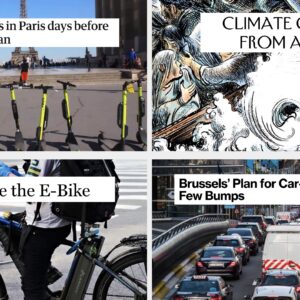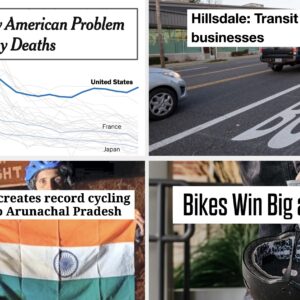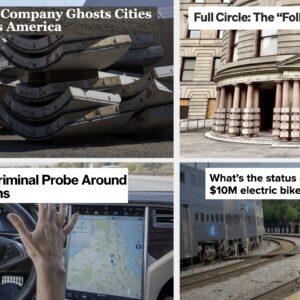The economics of stop signs; the toll of riding drunk; “blue gold;” job sprawl; free bikes for all; friendly robots
Time for the news.
– New U.S. research findings quantify the impact of air pollution on life expectancy. Another recent study found that low birth weight is linked to exposure to pollution.
– Mayor Adams and Governor Kulongoski take a test drive in one of Nissan’s new electric cars. This uncritically enthusiastic promotional movie shows both men tooling around in the car and giving big thumbs up to its speed, silence, efficiency, and prospects for bringing jobs to the region.
– “Bicyclists should stay on the sidewalk,” writes Zach Coleman, in an editorial for the Michigan State University newspaper. And if you’re riding a bike in the road, he adds, “I hope you’re wearing a helmet, because I might run you over.” This editorial has gained modest fame in the last week as a textbook example of publicly broadcast road rage.
– The Star-Ledger in New Jersey pokes fun at a proposed three foot buffer law, calling it “silly” and “unenforceable.”
– “Job sprawl” has an undeniable and disproportionate impact on the urban poor, says a new study.
– A New York City health department study has found that between 1996 and 2005, 21% of people who died in a bicycle crash had alcohol in their bloodstream.
– Platinum-winning bike-friendly city Davis, California, is slated to become home to a new Bicycle Hall of Fame museum.
– The South African department of transportation is considering a project in which it would work with a bicycle manufacturer to provide a bike for every person in the country.
– Salon.com makes the case for walking — “it’s what we were designed to do.”
– A fascinating post on the Oregon Economics Blog applies game theory to stop signs.
– Google Earth now has a map of CO2 emissions from fossil fuels in the United States.
– In somewhat related and completely sobering news, Texas oil mogul T. Boone Pickens is betting that water, or “blue gold” will be the next oil.
– Finally, for your enjoyment, the cute public space project of the week has got to be these little pedestrian robots in New York.







Thanks for reading.
BikePortland has served this community with independent community journalism since 2005. We rely on subscriptions from readers like you to survive. Your financial support is vital in keeping this valuable resource alive and well.
Please subscribe today to strengthen and expand our work.
As an MSU Alumnus I’m sad to see the State News print this. That said, I’m leaving a comment here not there b/c he’s already being berated enough.
FYI: MSU like PSU has a very strong cycling culture. Its a big campus and most students must either ride their bikes or the bus to get from class to class
“- A New York City health department study has found that between 1996 and 2005, 21% of people who died in a bicycle crash had alcohol in their bloodstream. “
Do they have statistics about the amount of cars involved in these bicycle crashes?
I’m also a Michigan State Alum, and sent a letter to the editor of the State News expressing how embarrassed I was that they are receiving national attention for this.
To everyone else out there, most Michigan State students would not agree with Zack Colman. It’s unfortunate that the newspaper has not published an apology yet – enough people have asked for one.
I read on the MSU paper website (in the comments of the “article”) that the editors printed it as “satire”– but it didn’t come off as that at all.
BikeSnobNYC also picked up the story, in his own little way.
Are we over-sensitive about this issue? Maybe– but it effects the safety of everyone on the road, so I think our sensitivity is justified.
As a former MSU student and longtime former Michigander, I’m embarrassed but not surprised to see this come from my state and school. I used to bike around the MSU campus, but never had any conflicts with cars (this was in 1990, however, and there were fewer students at MSU than today). I hope that the faculty and paper staff have the sense to issue an apology. Coleman’s “opinion” has many gaping holes that taken at face value are laughable, but illustrate the undercurrents of anti-cycling feeling in that part of the population for whom convenience is a state religion.
That game theory post is interesting but flawed. He has the outcome scoring weighted all wrong. If the score of “A = aggressive/B = aggressive” is -10 for both parties, but the score of “A = aggressive/B = cautious” is 10 for A, that means A’s reward for blowing through a stop without incident is equal to A’s penalty for crashing into another driver. That says in a two-cycle game, an aggressive driver could have a total score of 0, which would tie the score of a cautious driver, but the aggressive driver would have suffered a crash. That’s silly, and it’s not the way people drive. Not to say that all vehicle operators make the optimum risk/benefit calculations, but it makes this game outcome have no relevance in real life.
Now, if that blog would let me post a comment, I’d have said this there, too.
I’m all for electric cars to reduce pollution. But they are too quiet. Maybe they should be outfitted with cow bells
Zach Coleman is looking to get his tires slashed.